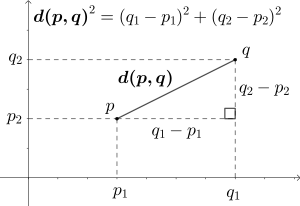Euclidean distance facts for kids
The Euclidean distance is the usual way to measure the straight-line distance between two points. Think of it like using a ruler to find how far apart two spots are. This distance is named after the ancient Greek mathematician Euclid. You can figure out this distance using the famous Pythagorean theorem.
Measuring Distance on a Flat Surface
Imagine you have two points on a flat surface, like a piece of paper. Let's call the first point p and the second point q.
If point p is at coordinates (p1, p2) and point q is at (q1, q2), you can find the distance between them.
The formula for this distance looks a bit like this:
- First, find the difference between the x-coordinates: (q1 - p1).
- Then, find the difference between the y-coordinates: (q2 - p2).
- Square both of these differences.
- Add the squared results together.
- Finally, take the square root of that sum.
This method is exactly like using the Pythagorean theorem. You're basically creating a right triangle where the sides are the differences in the x and y coordinates. The distance you're looking for is the hypotenuse of that triangle.
Related pages
Images for kids
See also
 In Spanish: Distancia euclidiana para niños
In Spanish: Distancia euclidiana para niños
 | Percy Lavon Julian |
 | Katherine Johnson |
 | George Washington Carver |
 | Annie Easley |



